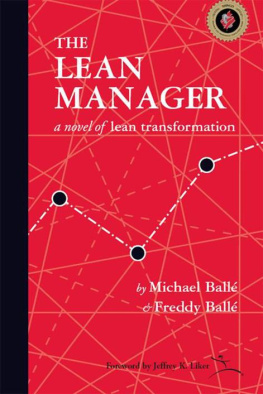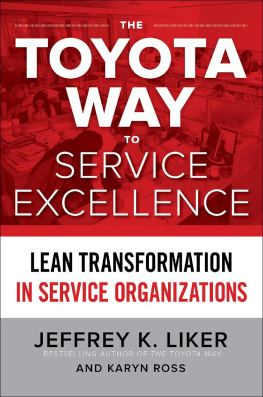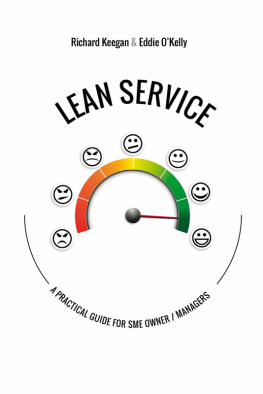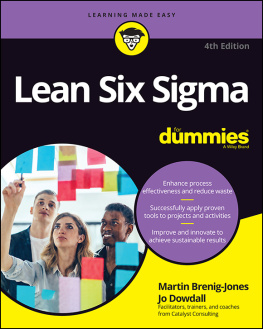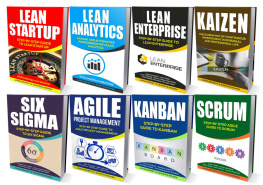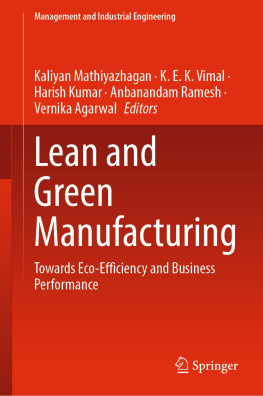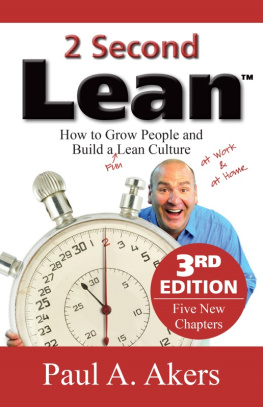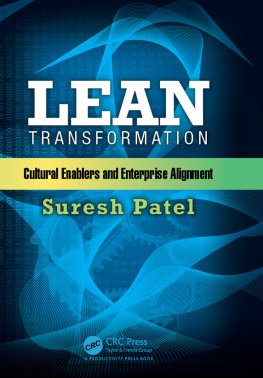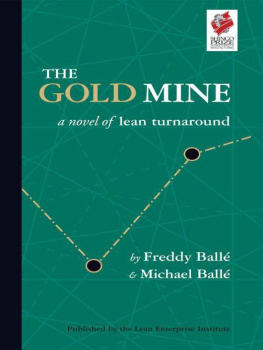Michael Balle - The Lean Manager: A Novel of Lean Transformation
Here you can read online Michael Balle - The Lean Manager: A Novel of Lean Transformation full text of the book (entire story) in english for free. Download pdf and epub, get meaning, cover and reviews about this ebook. year: 2009, publisher: Lean Enterprise Institute, Inc., genre: Detective and thriller. Description of the work, (preface) as well as reviews are available. Best literature library LitArk.com created for fans of good reading and offers a wide selection of genres:
Romance novel
Science fiction
Adventure
Detective
Science
History
Home and family
Prose
Art
Politics
Computer
Non-fiction
Religion
Business
Children
Humor
Choose a favorite category and find really read worthwhile books. Enjoy immersion in the world of imagination, feel the emotions of the characters or learn something new for yourself, make an fascinating discovery.
- Book:The Lean Manager: A Novel of Lean Transformation
- Author:
- Publisher:Lean Enterprise Institute, Inc.
- Genre:
- Year:2009
- Rating:4 / 5
- Favourites:Add to favourites
- Your mark:
- 80
- 1
- 2
- 3
- 4
- 5
The Lean Manager: A Novel of Lean Transformation: summary, description and annotation
We offer to read an annotation, description, summary or preface (depends on what the author of the book "The Lean Manager: A Novel of Lean Transformation" wrote himself). If you haven't found the necessary information about the book — write in the comments, we will try to find it.
The Lean Manager: A Novel of Lean Transformation — read online for free the complete book (whole text) full work
Below is the text of the book, divided by pages. System saving the place of the last page read, allows you to conveniently read the book "The Lean Manager: A Novel of Lean Transformation" online for free, without having to search again every time where you left off. Put a bookmark, and you can go to the page where you finished reading at any time.
Font size:
Interval:
Bookmark:
Also by Michael Ball and Freddy Ball
The Gold Mine


Copyright 2009 Lean Enterprise Institute, Inc. All rights reserved.
Lean Enterprise Institute and the leaper image are registered trademarks of Lean Enterprise Institute, Inc.
ISBN: 978-1-934109-31-1
Design: Off-Piste Design
Printed: July 2011
Library of Congress Control Number: 2009927190
This book is a work of fiction. Names, characters, businesses, organizations, places, events, and incidents either are the product of authors imaginations or are used fictitiously. Any resemblance to actual persons (living or dead), events, or locations is coincidental.
Lean Enterprise Institute, Inc.
One Cambridge Center
Cambridge, MA 02142
617-871-2900 fax: 617-871-2999 lean.org
For Roman and Alexandre
You can sense the frustration as Jenkinson explains to his young ward Andy: Customers come first. Deliver good parts on time. Reduce your costs. Work with your people so that they solve their own problems. Very original and unexpected, right?
Those of us who have been in the business of translating Toyotas revolutionary system to others have felt a similar frustration. How can we make this any simpler while still communicating the elegance of the Toyota Production System (TPS)? I have been in the business for almost 25 years. In that time there was the quality movement, an employee-involvement movement, a six sigma movement, and then a lean movement. Now there is a lean six sigma movement. Each of these movements viewed Frederick Taylors scientific management as the villain. We need to look beyond local efficiency and consider the whole system of people and processes. That understanding has been there, at an abstract level, but getting it embedded in the organization seems to be an overwhelming challenge.
I first became a fan of Michael and Freddy Ball when I read The Gold Mine. I liked the idea of a business novel, but did not expect an awful lot. As I read it I grew more and more excited. This is what I have been trying to communicate to my associates and clients for years. I immediately urged everyone I knew to read the book. Admittedly, my immediate enthusiasm that the book would transform their thinking was misplaced. That only happens by doing, a central message in the book you have before you, but we can all dream.
What got me so excited about The Gold Mine, and what The Lean Manager builds on, is that they are both good novels. Each grabs you and pulls you into the story. As you get immersed in the story you relate. You see your own problems in a different way. In short, you identify. What I have been trying to communicate to my clients and students is that TPS is a living system. It is not a toolkit or road map. You have to live it to understand it. It evolves. Yet companies find it overwhelmingly seductive to have a clear toolkit and road map. Consulting companies feed on this need and are all too happy to provide what their customers want. If I had to list the top five mistakes in learning from Toyota, they would be:
1. Giving it a name, e.g., lean six sigma, and making it a program.
2. Trying to PowerPoint and road map your way to lean.
3. Assigning the program to middle managers to deploy.
4. Failing to see this as a major cultural change that takes a lifetime to effect.
5. Senior management failing to take responsibility for leading the culture change.
Michael and I have had endless discussions about how to help organizations avoid these mistakes and move down the path of true cultural change. It is enormously complex, yet unbelievably simple. The most complex part is that you can only learn this system by doing the work. Yet people want to be convinced intellectually before they are willing to make a commitment to doing it.
In The Lean Manager, Jenkinson does what he has to do. As the CEO, he has the power to force people to do it or leave the company. He uses that power selectively. He clearly is focused on profitability, even if it means closing plants and letting employees go. In fact, he insists that when plants kaizen out a person that person (or equivalent) is out the door, especially if that person is not buying into change.
This is contradictory to the Toyota way that aims for mutual prosperity and trust with team members who are protected from layoffs if at all possible. The message from Jenkinson seems to be that the ship is so far off course that its very existence is threatened, and righting it through downsizing is essential to survival.
At the same time Jenkinson is clearly committed to developing people. He has learned the Toyota lesson of the value of investing in people. He also has learned a thing or two from his senseithat you have to identify people with the motivation to improve themselves, give them challenging goals, let them fail here and there, and support them as they learn. He is willing to let Andy struggle, but then periodically shows up to help Andy see new options. He asks Andy questions instead of giving him answers. This is very Toyota-like. The Socratic method is preferred over teaching by offering conclusions. The result is that even as CEO of a good-sized company, Jenkinson is able to penetrate down to the working level and change the culture. It also becomes clear in this story that without Jenkinsons leadership at the CEO level the plants would have no chance to find their way on their own. The Alnext Business System was a lifeless exercise because it lacked the drive and commitment of the former CEO.
To the employees who have not experienced the journey it seems contradictory that Jenkinson keeps talking about customers and investing in people and quality, while he is ordering them to reduce the quality department and shift authority from sales to engineering. In their paradigm, quality is the responsibility of the quality department, and customer satisfaction is the responsibility of the sales department. Jenkinson needs to be dictatorial to move the organization in fundamental ways and get them out of the bureaucratic rut they are in. As they experience real kaizen, they start to move themselves, and Jenkinson can shift from a role of dictator to one of coach and adviser.
How did we get to the point where we need someone at the top of the company to fundamentally rebuild the culture? Why do we need the CEO to tell us that we are in the business of deeply understanding our people and processes and focusing first and foremost on satisfying customers? We get a refreshing contrast through the eyes of Andys wife, Claire. As a small-business owner who grew up in the business, she knows exactly what her small riding center is about. She is intimately familiar with day-to-day operations and each person she has hired. She does not need to go to the safety department to look up the statistics on who is hurt as she takes a personal interest in each of her employees. She also knows the strengths and weaknesses of each and every horse. She understands what it takes to satisfy customers. She is the type of lean manager her husband needs to become.
All over the world there are small companies that have no trouble understanding that they depend for success on customer satisfaction, consistently delivering a value-added product or service, and they depend upon willing and able people to accomplish this. Something unhealthy happens as businesses grow and become increasingly bureaucratic. They lose their way. The secret to Toyota is that it managed to grow, become quite bureaucratic, and
Next pageFont size:
Interval:
Bookmark:
Similar books «The Lean Manager: A Novel of Lean Transformation»
Look at similar books to The Lean Manager: A Novel of Lean Transformation. We have selected literature similar in name and meaning in the hope of providing readers with more options to find new, interesting, not yet read works.
Discussion, reviews of the book The Lean Manager: A Novel of Lean Transformation and just readers' own opinions. Leave your comments, write what you think about the work, its meaning or the main characters. Specify what exactly you liked and what you didn't like, and why you think so.

